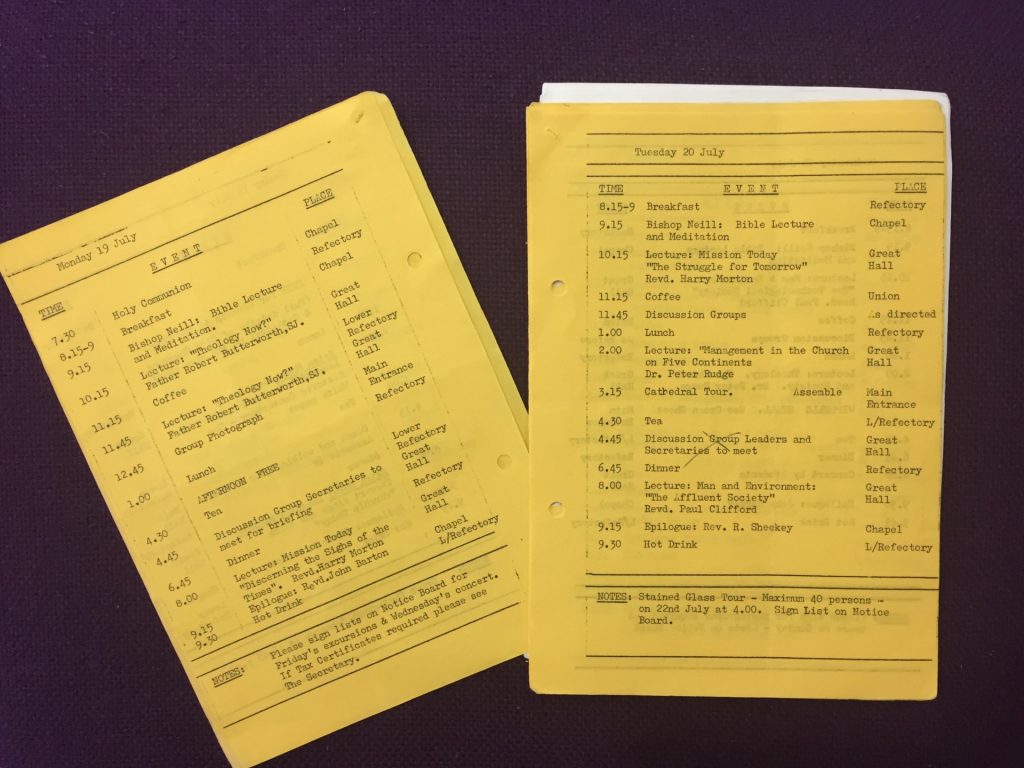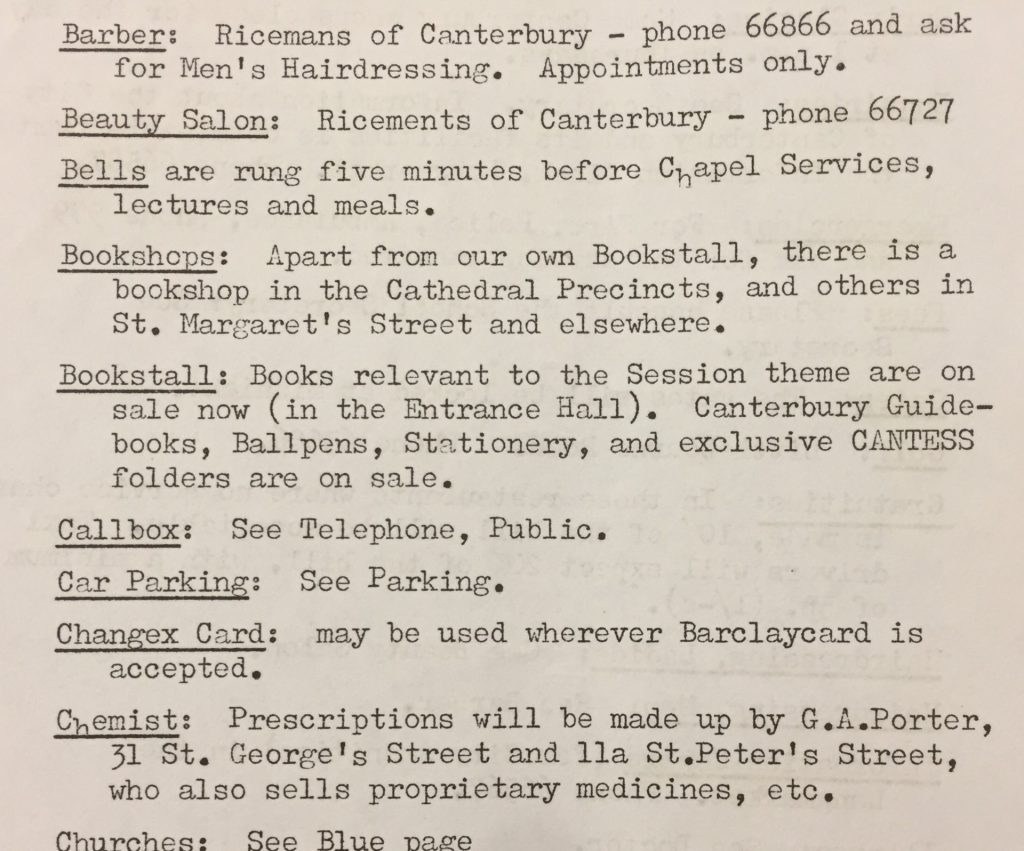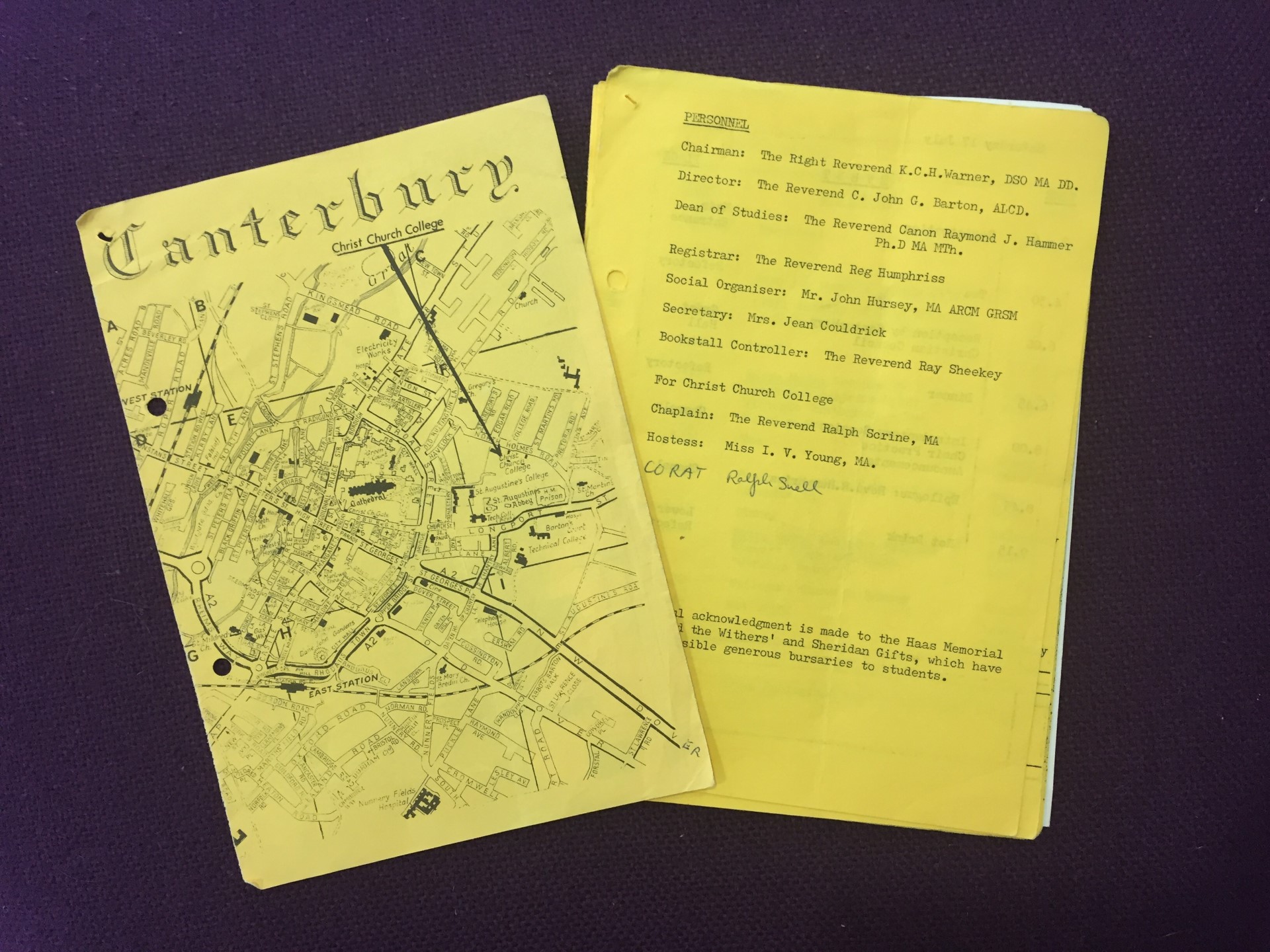We received a package in the library containing loose leaf type-written sheets detailing the events of a two week summer school that was held at Christ Church College at some time in the past. The parcel came with no letter or context. Read on to find out more about its history.
We love a conundrum in the library, so when this package arrived on my desk, I wanted to be able to write a meaningful description about it which would enable future scholars to locate it within our archives: “34 yellow loose leaf pages detailing an unknown summer school” was not going to cut the mustard. With a bit of sleuthing (okay so I’ll admit it, the donor wrote their address on the envelope) I was able to identify that it was sent by an architectural designer from Massachusetts who was studying art history and archaeology at Bard College between 1969-1973.
We know from the list of personnel on the first few pages that Reverend Ralph Scrine was chaplain at the College during this visit and as we have a photograph of Rev Scrine in our university archive which is dated 1969, this suggests the visit dates from this period.
Using a perpetual calendar, we were able to identify that the event did not take place in 1969 as the days of the week are included in the event list showing that the first day was Saturday 17 July. This dates the event to 1971.

We do not have any item that pertains to the visit in our archives currently, so we are thrilled to have received this item.
Now settle down with your hot drink ….
A reception was held on the first day by the Canterbury Christian Council. The Dean of Studies for the event was Canon Raymond Hammer who was a Lecturer in Theology at Birmingham University during 1965-77.
A search of the newspaper databases did not reveal any reports of the event but the loose leaf sheets reveal a wonderfully rich and varied fortnight of talks, visits, walks and concerts.
Extra mural events included a talk from Malcolm Stewart, Religious Programmes Producer for London Weekend Television who described in words and music ways of communicating Christian belief and there were trips to Chartwell and Sissinghurst.
One tour that sounded particularly interesting is the Monastery Tour, where the group visited Malling Abbey, the home of a contemplative order of Anglican nuns.
Delegates were encouraged to try a game of Bat and Trap at the Old Beverlie, go boating on the Stour, visit Canterbury’s Norman Castle and even take advantage of the inexpensive air and coach service to Paris run by Skyways International from Ashford Airport. (Who knew it! They obviously had more fun in the 1970s!)
The university gates were locked at midnight, but no doubt everyone had returned for their evening hot drink in the lower refectory by 9.15 pm
The Bookstall Controller
There were no late nights or 24/7 opening in the College Library which was only open between 2- 4 pm and woe betide anyone who was planning on taking a book into the garden as you were given strict instructions in capital letters “BOOKS MAY NOT BE REMOVED”. There was also a Bookstall Controller who was Rev Sheekey. (You’ll be glad to know we don’t have controllers on campus now, just very friendly staff in the bookshop)
Rapid watch repairs could be undertaken at Lefevres, should you overwind your watch in the excitement of the summer school. and a colour television was available in a room near the Student’s Union. Alternatively delegates wishing to listen to popular music could hire a radio from Rediffusion on Orange Street, and listen to the sounds of ‘Chirpy Chirpy Cheep Cheep’ or ‘River Deep, Mountain High’. I hope our lovely donor had a wonderful time.
I think my favourite talk title during the summer school must be “Discerning the Sighs of the Times” by Rev Harry Morton. I hope this wasn’t a typo for “signs” as the 34 typed sheets are wonderfully accurate (apart from Ricements for Ricemans).
So what was the conference?
The only clue to the name of the conference (as the loose leaf sheets have been taken out of their original binding) is a reference to the exclusive “CANTESS” folders that are being sold by the Bookstall.

This was the clue we needed to definitively identify the event. A google Search of CANTESS 1971 brought up a range of documents including a SEDOS bulletin which mentions a Canterbury Summer School in 1972.
SEDOS is a forum open to all the Roman Catholic institutes of Consecrated life which commit themselves to deepening their understanding of global mission. A report on the CANTESS summer school in Canterbury in 1972, gave us the valuable context we need to complete the catalogue entry:
CANTESS 1972 – CANTERBURY SUMMER SCHOOL, International and Ecumenical – 15-2 7 July 1972
The 1972 theme is “Hold the Faith” Eminent lecturers of various denominations will share their insights about: “THE GLORY OF GOD” – “PRAYER” – “PROVIDENCE” – “JESUS CHRIST” – “CHRISTIAN RESTATEMENT IN THE WORLD TODAY” – “ST, PAUL IN HIMSELF, ST- PAUL AND THE OTHERS”, and small groups will study in WORKSHOPS subjects of special interest, A brochure is available at SEDOS For information and bookings apply: CANTESS, 14 Dover Street, Canterbury, Kent, England.
This summer school held a year later provides rich supporting information. It gave us the address of 14, Dover Street and so we headed back to the newspaper archives. By 1972, this address was being used by a company selling hearing aids. Had CANTESS moved on or were they sharing the building? Another mystery….
Time to file away our new treasure
We don’t need to know everything, so we quit while we are ahead. We have a date, we know the event, we have a donor and provenance. Our catalogue description can be completed.
What is lovely is that our American donor held on to this material for fifty two years, so I am hoping these were fond memories of a visit to Canterbury and thank you for sending these!
If you would like to research archival material like this, come and volunteer at the university archives! We meet on Thursday, but do email michelle.crowther1@canterbury.ac.uk to express interest.
 Library
Library Michelle Crowther
Michelle Crowther 1027
1027


